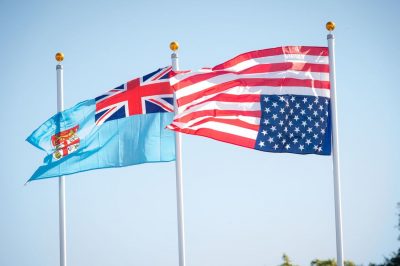Fiji in the Pacific Ocean Isn’t Fighting ISIS-Daesh, It’s Being Used by the US to Send a Signal to China

Note to readers: please click the share buttons above. Forward this article to your email lists. Crosspost on your blog site, internet forums. etc.
Fiji’s inclusion as the latest member of the US’ anti-Daesh coalition in Syria has nothing at all to do with protecting the island nation’s people from the world’s worst terrorist group but is the US’ way of pressuring the country to send a none-too-subtle signal to China.
A rather peculiar bit of news emerged earlier this week when the official Twitter account of the US’ “Operation Inherent Resolve”, the formal name of its anti-Daesh coalition in Syria, posted that the South Pacific Island nation of Fiji became the 79thmember of this campaign. The country is literally located on the other side of the world and has no interests whatsoever in the Mideast, nor is it facing any credible threat – whether immediate or latent – from the world’s worst terrorist group. No further details have been forthcoming thus far so it’s unclear whether Fiji will physically “fight Daesh” (which has nowadays become a euphemism for perpetuating the occupation of Kurdish-controlled northeastern Syria) by volunteering its soldiers as cannon fodder for the US or if it’s just signing on for symbolism’s sake.
For those who might not be aware of Fiji’s history, the country was recently shunned by the West after its 2006 military coup, the leader of which still serves as its Prime Minister. It was during that time that China brought the country in from the cold, proverbially speaking, and made impressive strategic inroads with the most influential state in this geographically broad but sparsely populated space. The West normalized its relations with Fiji since then after lifting its sanctions against the country in 2014, but it appears as though they’ve somehow managed to convince its leadership of the need to join the anti-Daesh coalition in Syria in order to also send a signal to its strategic partner China. It can’t be known for sure, but two possible explanations exist for why this happened.
The first one is that Fiji strategically capitulated to the US and Australia, striking some sort of deal with them to avoid any prospective anti-Chinese pressure against it in exchange for gradually moving away from Beijing. This interestingly resembles the second explanation except for its intent and intensity, which is that the decision shouldn’t be seen as anti-Chinese but rather as part of a delicate and circumstantially necessitated “balancing” act, the success of which could lead to the reinforcement and possibly even strengthening of China’s strategic presence there if it ends up deterring the “Hex” from destabilizing Fiji. It’s far too soon to say which of these two explanations most accurately accounts for why Fiji joined the anti-Daesh coalition, though it’s fair to say that it nevertheless sends a none-too-subtle signal to China that the US remains the South Pacific hegemon.
*
This article was originally published on Eurasia Future.
Andrew Korybko is an American Moscow-based political analyst specializing in the relationship between the US strategy in Afro-Eurasia, China’s One Belt One Road global vision of New Silk Road connectivity, and Hybrid Warfare. He is a frequent contributor to Global Research.

